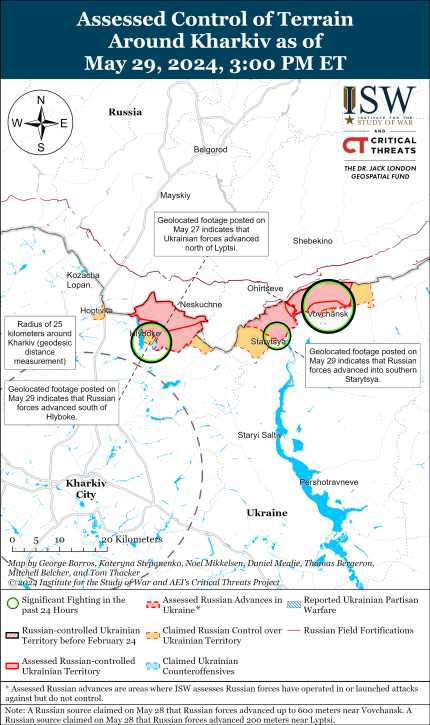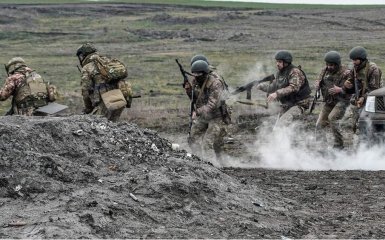At the frontline in Ukraine, Russian occupiers are advancing near Kreminna, Chasiv Yar and Avdiivka. In the Kharkiv region, the occupiers are also pressing near Lyptsy and Vovchansk, but Ukrainian defenders in this area are forcing the enemy to go on the defensive.
Ukrainian Army “blunted” Russian offensive in the Kharkiv region
The troops of the Russian Federation have recently advanced slightly near Lyptsi in the Kharkiv region.
Geolocation footage released on May 29 shows that the occupiers have recently advanced slightly within southeastern Hlyboke.
The commander of the Ukrainian battalion operating in the Kharkiv direction stated that the enemy is accumulating personnel near Hlyboke, using light equipment (motorcycles and ATVs) to bring the infantry closer to the front line.

Russian military noted the increase in the pace of offensive actions of the Russian Federation near Lyptsi and claimed that Russian troops had advanced up to 350 meters in the direction of Lyptsi.
Ukrainian military observer Kostyantyn Mashovets said that units of the Russian 18th Motorised Rifle Division have moved to "active defence" on the Hlyboke-Lukyantsi line.
He suggested that the Armed Forces of Ukraine (AFU) may have slowed down the Russians' advance and forced them to switch to tactical defence.
The General Staff of the Armed Forces reported that the enemy was also conducting an assault in the direction of Zelene (east of Liptsi).
Russian troops recently advanced near Vovchansk. Geolocation footage released on May 29 shows that the invaders have advanced within Starytsa.
Russian bloggers claimed that Russian troops had allegedly advanced up to 350 meters in the Vovchansk direction, and that the AFU were counterattacking in Vovchansk.
The General Staff of the Armed Forces informed that the enemy was storming Synelnikovo (southwest of Vovchansk).
What is known about reasons for failure of Russian offensive in Kharkiv region
It is noted that another reason for the failure was the refusal of the command of the occupation army of the Russian Federation to use the maximum number of reserve forces in the offensive.
Analysts emphasize that on May 10, the sudden offensive of the Russian occupiers caught Ukrainian defenders in the border areas of Kharkiv Oblast by surprise.
This allowed the war criminals of the Russian army to achieve significant tactical successes.
The Institute for the Study of War (ISW) also recalled that on May 25, the State Bureau of Investigation (SBI) announced the start of an investigation into the improper training of the Ukrainian defence in this area and the abandonment of positions by individual units of the Armed Forces of Ukraine in the area of the village of Lypky and the city of Vovchansk.
According to the SBI, because of this, the Russian occupiers were able to advance to the second line of defence of the Armed Forces without any problems.
However, the limited number of personnel involved did not allow the units of the Russian army to achieve a deeper breakthrough.
The Russian military command believed that the concentration of larger forces would alert the Ukrainian troops and deprive them of the opportunity to carry out an operational surprise. However, Russia's decision not to immediately deploy significant reserves did not allow Russian troops to achieve quick successes and deeper penetration, analysts concluded.
The Institute for the Study of War noted that the Defence Forces had established defensive positions in the area.
Instead, the Russian army used its tactical opportunity to achieve relatively quick successes against positions that were fortified and controlled by the Armed Forces of Ukraine.

